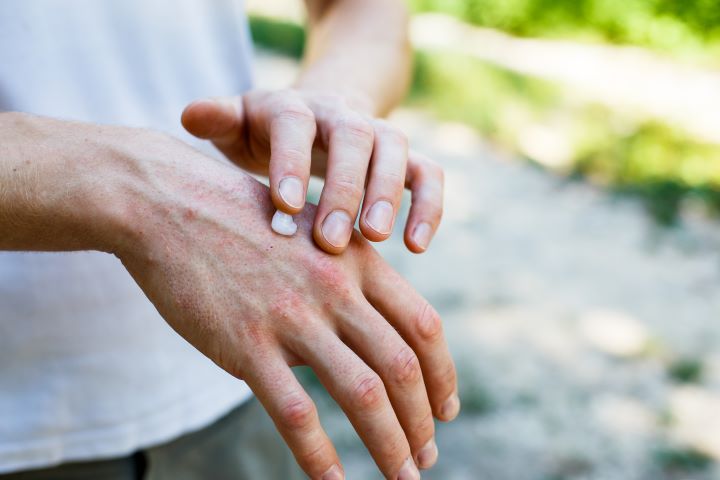A Guide to Eczema Management: Recognizing Signs and Finding Relief for Healthier Skin
Eczema, a chronic skin condition affecting millions worldwide, can be frustrating and uncomfortable. However, with proper understanding and management, individuals can find relief and improve their skin health. This comprehensive guide explores the key aspects of eczema, from identifying common signs to exploring effective treatment options, helping you take control of your skin's well-being.

What are the common signs of eczema?
Recognizing the signs of eczema is crucial for early intervention and effective management. The most common symptoms include:
-
Dry, itchy skin: This is often the first and most persistent symptom of eczema.
-
Redness and inflammation: Affected areas may appear red, swollen, or inflamed.
-
Rough, scaly patches: The skin can become rough, scaly, or leathery in texture.
-
Small, raised bumps: These may appear and can leak fluid when scratched.
-
Cracking or oozing skin: In severe cases, the skin may crack, bleed, or ooze.
Eczema can affect various parts of the body, including the face, hands, feet, and the creases of elbows and knees. The appearance and severity of symptoms can vary from person to person and may change over time.
How can you understand triggers that worsen eczema?
Identifying and avoiding triggers is a crucial step in managing eczema. Common triggers include:
-
Environmental factors: Extreme temperatures, low humidity, and exposure to allergens like dust mites or pollen.
-
Irritants: Harsh soaps, detergents, fragrances, and certain fabrics like wool or polyester.
-
Stress: Emotional stress can exacerbate eczema symptoms.
-
Food allergies: Some individuals may experience flare-ups after consuming certain foods.
-
Hormonal changes: Fluctuations in hormones, particularly in women, can affect eczema.
Keeping a symptom diary can help you identify personal triggers. Note your activities, diet, and environmental factors alongside any changes in your skin condition. This information can be valuable for both self-management and discussions with healthcare providers.
What are effective daily care practices for eczema?
Establishing a consistent skincare routine is essential for managing eczema and maintaining skin health. Consider incorporating these practices:
-
Gentle cleansing: Use lukewarm water and mild, fragrance-free cleansers.
-
Moisturizing: Apply a thick, emollient-rich moisturizer immediately after bathing to lock in hydration.
-
Avoiding hot showers: Opt for short, lukewarm showers or baths to prevent skin dryness.
-
Wearing appropriate clothing: Choose soft, breathable fabrics like cotton and avoid rough materials.
-
Managing stress: Practice stress-reduction techniques like meditation or yoga.
-
Maintaining a healthy diet: Consume a balanced diet rich in anti-inflammatory foods.
Consistency is key when it comes to eczema care. Stick to your routine even when symptoms improve to help prevent flare-ups.
What are the treatment options and their costs?
Eczema treatment often involves a combination of self-care practices and medical interventions. Common treatment options include:
-
Topical corticosteroids: These reduce inflammation and itching.
-
Topical calcineurin inhibitors: Non-steroidal creams that help manage symptoms.
-
Antihistamines: Oral medications to relieve itching.
-
Phototherapy: Controlled exposure to UV light to reduce inflammation.
-
Biologics: Injectable medications for severe cases.
Treatment costs can vary significantly depending on the type and severity of eczema, as well as the chosen treatment method. Here’s a general overview of potential costs:
| Treatment Type | Average Cost Range (USD) | Frequency |
|---|---|---|
| Over-the-counter moisturizers | $10 - $50 | Monthly |
| Prescription topical medications | $30 - $100 | Monthly |
| Oral antihistamines | $5 - $20 | Monthly |
| Phototherapy sessions | $100 - $300 | Per session |
| Biologic medications | $1,000 - $3,000 | Monthly |
Prices, rates, or cost estimates mentioned in this article are based on the latest available information but may change over time. Independent research is advised before making financial decisions.
It’s important to note that insurance coverage can significantly impact out-of-pocket expenses. Consult with your healthcare provider and insurance company to understand your specific coverage and potential costs.
When should you seek professional help for eczema?
While many cases of eczema can be managed with self-care and over-the-counter treatments, there are times when professional medical intervention is necessary. Seek help from a dermatologist or healthcare provider if:
-
Your symptoms are severe or worsening despite self-care efforts.
-
Eczema is significantly impacting your quality of life or daily activities.
-
You develop signs of skin infection, such as increased redness, warmth, or pus.
-
Your eczema is widespread or affects sensitive areas like the face or genitals.
-
You’re experiencing sleep disturbances due to itching or discomfort.
-
You need guidance on identifying triggers or creating an effective management plan.
A healthcare professional can provide a proper diagnosis, recommend appropriate treatments, and offer personalized advice for managing your specific case of eczema.
Managing eczema effectively requires a comprehensive approach that combines understanding your condition, identifying triggers, establishing good skincare practices, and exploring appropriate treatment options. By taking an active role in your skin health and seeking professional help when needed, you can find relief from eczema symptoms and enjoy healthier, more comfortable skin.
This article is for informational purposes only and should not be considered medical advice. Please consult a qualified healthcare professional for personalized guidance and treatment.




